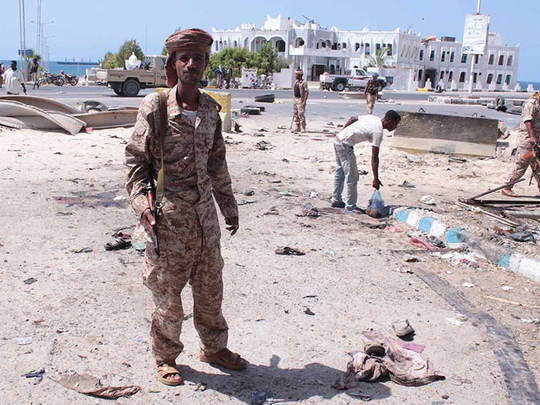
Aden: A wave of suicide bombings targeting Yemeni troops killed at least 42 people Monday in the southeastern city of Al Mukalla, officials said, in attacks claimed by Daesh.
The attacks came as the government and Al Houthi rebels planned to suspend talks on ending Yemen’s larger conflict after failing to reach a breakthrough in two months of negotiations held in Kuwait.
The capital of Hadramawt province, Al Mukalla had been under the control of Al Qaida for one year until pro-government troops backed by a Saudi-led coalition recaptured the city in April.
But Daesh claimed responsibility for the attacks, saying in a statement that eight of its suicide bombers killed 50 members of Yemen’s security forces, according to the Israeli-run monitor SITE Intelligence Group.
The governor of the vast province, Ahmad Saeed Bin Breyk, said previously that Al Mukalla had “witnessed five suicide attacks in four areas”.
Three simultaneous bombings hit security checkpoints in the coastal city at sunset, just as troops were ending their fast, a security official said.
In the first attack, a suicide bomber on a motorbike asked soldiers if he could eat with them before blowing himself up, the official said.
Two other bombers approached soldiers on foot elsewhere in the city before detonating their explosives.
Shortly afterwards, two suicide bombers launched a fourth attack and blew themselves up at the entrance of an army camp, the official said.
In all, the attacks killed 40 soldiers as well as a woman and child who were passing by and wounded 37 other people, said Hadramawt’s health chief Riad Al Jalili.
Witnesses said gunfire echoed across the city, followed by ambulance sirens. The Daesh affiliate said in an online statement that it launched four suicide bombings against counterterrorism forces.
Emirati forces from the Saudi-led coalition, which are guarding the city’s port and the airport, have sealed off several main streets. Officials said the death toll is expected to rise.
Al Qaida retains a strong presence in Al Mukalla, and the terrorists still control several towns in the interior valley of Wadi Hadramawt.
Last month, the Pentagon said a “very small number” of US military personnel had been deployed around Al Mukalla in support of pro-government forces.
The US Navy has several ships nearby, including an amphibious assault vessel, the USS Boxer, and two destroyers.
Al Qaida in the Arabian Peninsula, or AQAP, has been based in Yemen since 2009.
Both it and Daesh have exploited the power vacuum created by the conflict in the impoverished country to expand their presence in the south and southeast.
In May, a suicide bombing claimed by Daesh and a second blast killed 47 police in Al Mukalla — a city of 200,000 people.
There has been no let-up in the long-standing US air war against AQAP, which it regards as the terror network’s most dangerous.
US strikes have taken out a number of senior Al Qaida commanders in Yemen over the past year.
The US military said this month that it had killed six Al Qaida fighters in three separate strikes in central Yemen.
AQAP “remains a significant threat to the region, the United States and beyond,” said US Central Command, which oversees military operations in the Middle East.
On June 16, CIA director John Brennan told the Senate Intelligence Committee AQAP had several thousand “adherents and fighters” while there are also “several hundred” fighters loyal to the Daesh group in the war-torn country.
In recent months, AQAP and Daesh militants have also claimed several attacks on government and coalition targets in second city Aden, where the government has its base.
The Saudi-led coalition intervened in Yemen in March 2015 in support of President Abd Rabbo Mansour Hadi against Al Houthi rebels who had seized the capital Sana, a and other areas.
But it later turned its firepower against terrorists impeding the government’s bid to firm up its grip on southern areas recaptured from the rebels.












